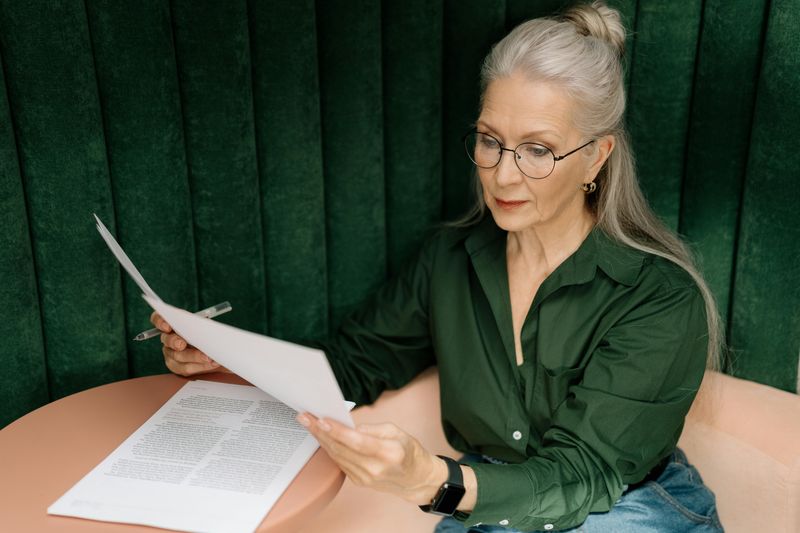15 Harsh Realities You Can’t Ignore Once You Hit Your 40s and 50s

Growing older brings wisdom and experience, but also some uncomfortable truths. As we cross into our 40s and 50s, our bodies, priorities, and perspectives undergo significant shifts. These changes aren’t always welcome, but acknowledging them helps us navigate this new chapter with grace and purpose.
1. Your Health Becomes A Priority

Remember when you could eat anything, sleep little, and still feel amazing? Those days vanish in midlife. Your body now sends clear signals when you ignore its needs.
That annual physical isn’t optional anymore. Blood pressure, cholesterol, and hormones need regular monitoring. Even minor health issues demand attention before they become major problems.
Many find themselves reluctantly cutting beloved foods, adding supplements, and scheduling workouts like important meetings. It’s not vanity—it’s necessity. Your future quality of life depends on health choices you make today.
2. Friendships Change

The bustling social calendar of your younger years gradually transforms into a carefully curated circle. Quality trumps quantity as your 40s and 50s progress.
Friendships based solely on convenience or circumstance naturally fade away. The people who remain are those who truly understand your journey, share your values, and make time for real connection despite busy lives.
Many find this friendship evolution initially jarring but ultimately freeing. The relationships that survive this natural filtering process often deepen remarkably, offering authentic support through life’s increasingly complex challenges.
3. The Technology Gaps Widen

There was a time when mastering email or Facebook felt like a real win. Now, with constant updates and new platforms launching every week, it’s hard not to feel like you’re falling behind.
Your younger colleagues navigate digital tools effortlessly while you secretly Google how to use features they consider obvious. Apps your children use remain mysterious, creating an unexpected generational divide.
This isn’t about intelligence—it’s about neuroplasticity and exposure. Accepting that staying current requires deliberate effort becomes necessary. The choice becomes clear: continuously adapt or risk becoming digitally irrelevant in both professional and social spheres.
4. Empty Nest Syndrome

The transition to an empty nest is a meaningful milestone. A home once alive with the chatter of children suddenly feels quieter, carrying both liberation and loss.
This shift encourages reflection and creates space to rekindle old interests and deepen relationships. While the initial silence may feel like a void, it can soon reveal new possibilities.
Many parents discover fresh purpose—whether reconnecting with a partner, exploring long-forgotten passions, or embracing new adventures. By leaning into this stage, the empty nest becomes less about absence and more about growth, renewal, and a revitalized outlook on life.
5. Your Career Isn’t Everything

What once felt like success—titles, salaries, recognition—can start to feel empty by midlife. The ambition remains, but it’s now directed toward purpose, not just progress.
Many professionals hit their 40s and wonder why they sacrificed family dinners and personal passions for extra hours at the office. The question shifts from “How can I climb higher?” to “Does this work matter?”
This perspective shift isn’t giving up—it’s growing up. Finding meaning, mentoring others, and creating balance become the true measures of career success as the second half of life approaches.
6. Sleep Becomes Non-Negotiable

Those college days of all-nighters followed by productive mornings? Gone forever. Your body now demands proper rest, making sleep quality a cornerstone of daily functioning.
Many discover that late-night socializing comes with a hefty two-day recovery tax. The 3 a.m. bathroom trips and mysterious 4 a.m. worry sessions become unwelcome fixtures. Sleep patterns change dramatically, often pushing you toward earlier bedtimes and dawn awakenings.
Mattress quality, bedroom temperature, and sleep hygiene transform from afterthoughts into essential considerations. Good rest isn’t luxury anymore—it’s the foundation that determines whether tomorrow will be productive or painfully foggy.
7. Wisdom Wins Over Knowledge

Over time, the obsession with collecting facts gives way to a deeper skill: making connections. It’s not just what you know, but how you bring ideas together in ways that create meaning.
Work conversations reveal this shift clearly. Younger colleagues may know more current details, but your pattern recognition and contextual understanding prove invaluable. You’ve seen enough cycles to recognize when “revolutionary” ideas are simply repackaged concepts.
Many find themselves speaking less but saying more. The constant need to prove intellectual worth diminishes as confidence in your accumulated wisdom grows. This transition from knowledge-collector to wisdom-holder brings unexpected calm and clarity to decision-making in all life areas.
8. Financial Security Feels Different

Money worries take on new dimensions as retirement looms closer. That distant financial horizon suddenly appears on your five-year roadmap, creating fresh urgency around savings.
Questions multiply: Will Social Security exist? Is my 401(k) adequate? Should I downsize now? The financial mistakes of your youth no longer seem recoverable with decades of earning ahead.
Many experience a sobering reality check when retirement calculators reveal the gap between dreams and reality. This awakening often triggers difficult conversations about lifestyle adjustments, working longer than planned, or redefining what retirement means altogether. Financial planning shifts from optional to essential.
9. Your Aging Parents Need More Attention

As your parents age, the dynamic quietly shifts. The ones who once seemed invincible now ask for help—with phones, doctors, and sometimes just getting through the day. It’s a deeply personal transition few are prepared to talk about.
Family gatherings reveal subtle changes—Dad repeating stories, Mom struggling with steps. Conversations about driving safety, medication management, and future living arrangements become necessary yet uncomfortable.
Many find themselves in the “sandwich generation,” simultaneously raising children while caring for parents. This dual caregiving role stretches emotional resources and time management skills to their limits, creating a profound lesson in human vulnerability and connection across generations.
10. Haunted by the “What Ifs” of Your Youth

In quiet moments, memories of the life you didn’t choose tend to show up unannounced. The job you passed on, the relationship you let go, the move you never made—all come back with a surprising emotional weight.
These reflections aren’t always regrets. Sometimes they’re simple curiosity about parallel lives that might have unfolded. The mathematical reality that you’ve likely lived more years than remain ahead sparks natural life review.
Many find peace by acknowledging these “ghost lives” without judgment. The choices that seemed monumental in youth reveal themselves as just single turns in a complex journey. This reconciliation with past decisions often creates space for intentional choices in the chapters still unwritten.
11. You Become More Selective

The FOMO (fear of missing out) that drove your social calendar for decades mysteriously evaporates. Suddenly, declining invitations feels liberating rather than anxiety-inducing.
Energy becomes a precious resource you allocate carefully. Spending time with people who drain you or attending events out of mere obligation starts feeling like an unaffordable luxury. Your bullshit detector sharpens remarkably, cutting through pretense and inauthenticity.
Many discover the joy of saying “no” without elaborate excuses. This selectivity isn’t about becoming antisocial—it’s about recognizing time’s increasing value. The question shifts from “What might I miss?” to “Is this truly worth my limited time?”
12. Appearance Is Less Important

The mirror reveals changes no serum can reverse—gray hairs multiply, laugh lines deepen, and bodies soften. Initially distressing, many find unexpected freedom in this physical transformation.
Fashion choices gravitate toward comfort over trends. High heels and restrictive clothing lose their appeal when weighed against back pain and pinched toes. The mental energy once spent fretting over minor physical flaws gets redirected toward more meaningful concerns.
This shift isn’t giving up—it’s perspective evolution. Physical attributes that once seemed central to identity take appropriate backseat to character, relationships, and personal growth. Many discover genuine confidence paradoxically arrives when appearance matters less.
13. You Face Mortality

It sneaks in gradually. A friend’s unexpected diagnosis. A text about someone’s passing. The quiet realization that your parents are aging into unfamiliar territory. Death, once a concept, becomes part of the conversation.
Obituaries that once seemed irrelevant become meaningful reading. You notice birth years matching your own. Health scares trigger existential questions that can’t be easily dismissed.
Many find this mortality awakening ultimately positive despite its discomfort. Priorities clarify with remarkable speed when time feels finite. Relationships deepen, petty concerns diminish, and authentic living becomes non-negotiable. The question shifts from “How long will I live?” to “How fully can I live the time that remains?”
14. Gratitude Deepens

Everyday comforts you barely noticed before start feeling like treasures. That first sip of coffee, a night without interruption, or catching up with a longtime friend gain unexpected meaning.
After weathering life’s inevitable storms—health scares, relationship challenges, career setbacks—many develop genuine thankfulness for stability. The ordinary moments between major life events reveal themselves as life’s true substance.
This gratitude isn’t naive positivity; it’s hard-earned perspective. Having witnessed how quickly circumstances can change, appreciation for what remains constant grows immensely. Many find themselves mentally cataloging daily gifts rather than fixating on what’s missing—perhaps the most valuable midlife shift of all.
15. You Embrace Change

Earlier in life, transitions feel like obstacles. Later, they become stepping stones. Experience teaches that every ending creates room for something new and often unexpected to take root.
Career pivots, relationship evolutions, or lifestyle adjustments that once seemed threatening become opportunities for reinvention. The narrative shifts from “I’m too old to change” to “I’m too experienced not to evolve.”
Many discover their most significant achievements and deepest joys arrive after 40. This adaptability isn’t resignation to circumstance but active participation in life’s natural progression. The certainty that you’ve survived previous transformations creates confidence that future changes, while challenging, won’t break you.

Comments
Loading…